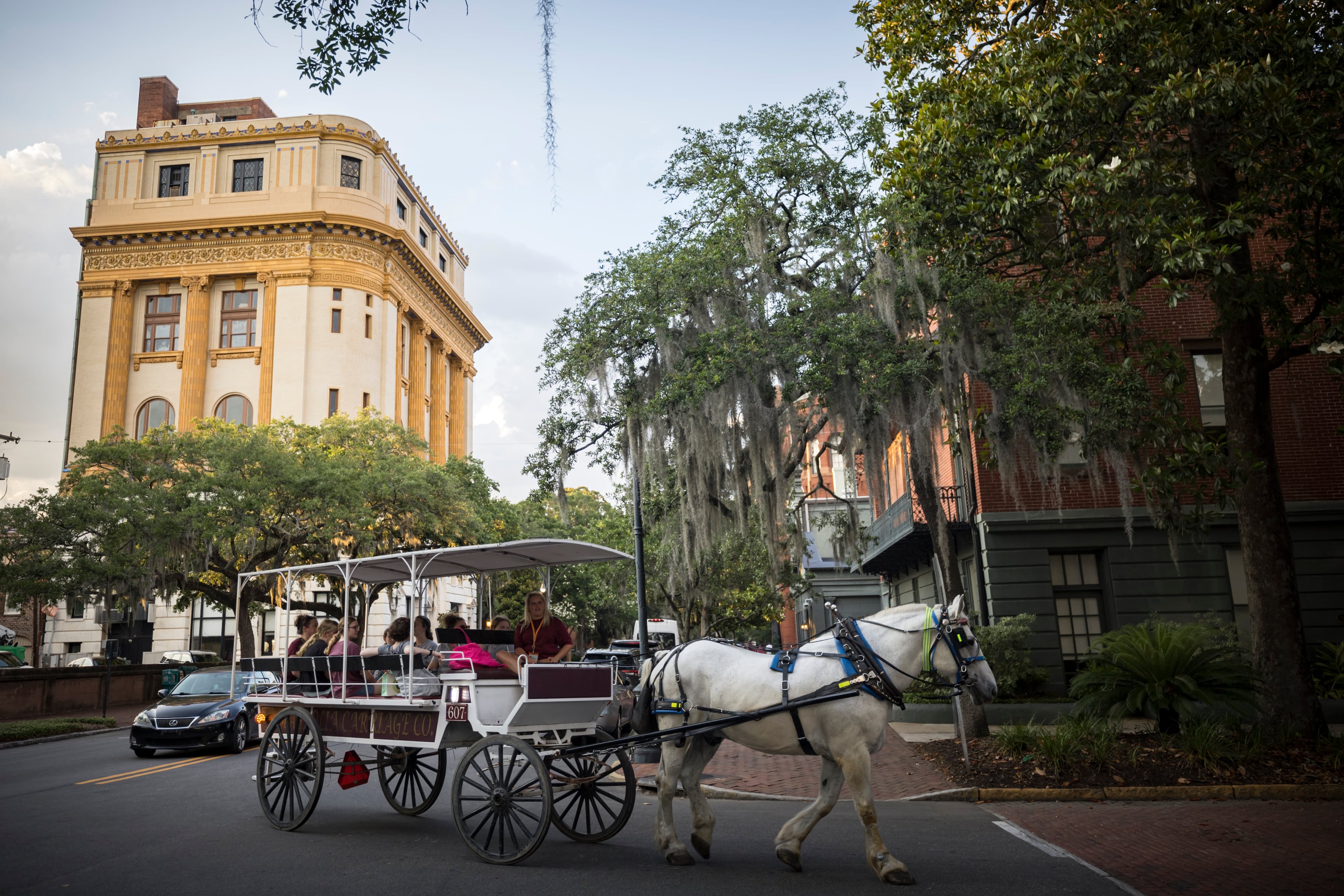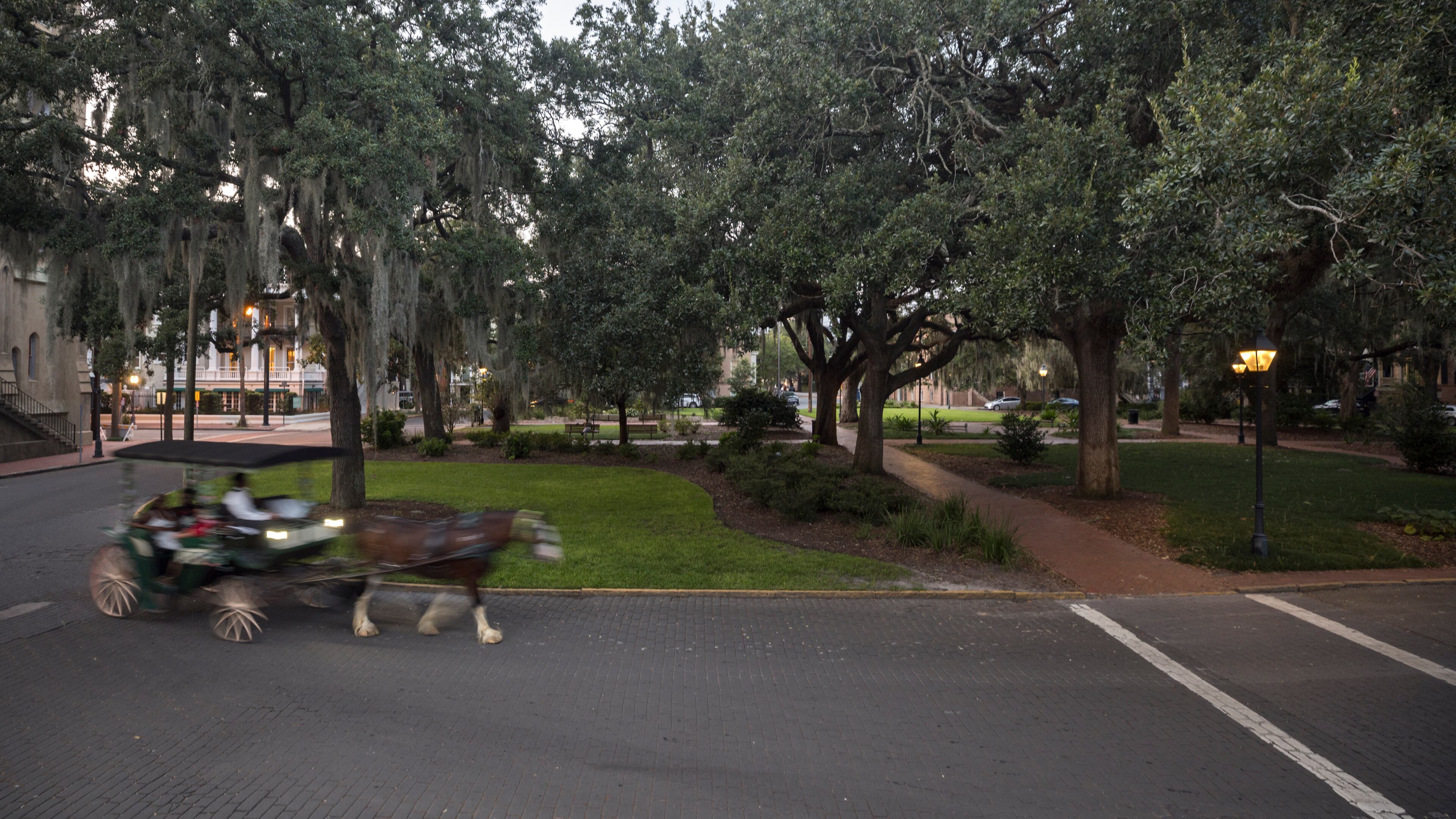How hot is too hot for carriage tour horses in sweltering Savannah?

SAVANNAH ― The horse-drawn tour carriage rounded Oglethorpe Square late on a sweltering June morning as City Manager Jay Melder crafted a memo about the National Weather Service’s first heat advisory of the year.
Alderman Nick Palumbo, sitting next to Melder in a meeting room with windows overlooking the picturesque square, nudged his neighbor and silently pointed in frustration at the animal-powered wagon. Why did the city government open cooling centers for people and suspend city services when the heat index is projected to hit 108 but not protect the horses until the index reaches 110?
“It just doesn’t make any sense, and that’s what I was trying to get across,” Palumbo said later in recounting the exchange.
The interaction is what Palumbo considered a tipping point in a long-simmering saga over Savannah’s horse carriage tour trade. Animal welfare activists have spent a decade pushing for reforms or an outright ban on the use of the 30 or so draft horses to tour the city’s charming downtown historic district.
The Savannah City Council is expected on Aug. 14 to amend the horse tour ordinance for the first time since 2017. The change would lower the temperature at which carriage operators must suspend tours because of extreme heat. The current standard mirrors state law and is 95 degrees or a 110-degree heat index, and the council will consider proposals that could reduce the threshold to as low as 85 degrees or a 100-degree heat index.
This summer has been unusually hot, even by Savannah standards, with heat advisories issued for 12 days since June 25. Advisories take into account the combined effect of temperature and humidity, as measured by the heat index, and are issued when the index is forecast to hit 108 degrees.
Then there was a galvanizing event on July 5: At a protest organized by local animal welfare activists, a horse carriage tour company employee dumped a bucket of horse-drinking water on Palumbo. The dousing was caught on camera and the video went viral with more than 31,000 views on YouTube, attracting national media interest.
The water tosser was fired that same day by the carriage tour operator, who condemned his actions. But at a council meeting the next week, with an ordinance change proposal on the agenda and dozens of animal welfare activists in the gallery, Palumbo’s fellow council members decried the incident and voiced support for tightening heat restrictions.
Mayor Van Johnson was among them. He said he often interacts with the carriage tour operators while out and about downtown and learns about the horses working that day. “Each horse has a story,” he said, and he’s always impressed with the care the animals receive.
“There are some on the council who feel we shouldn’t have horses in the streets at all, but at the other end of it, we’re talking about small businesses,” he said. “I think we can find balance” in revising the ordinance.
A peek behind the barn stalls
Cara Marshall operates her carriage tour business out of a barn tucked next to a railroad track a half-mile east of Savannah’s historic district. With mud on her boots, sweat on her brow and a mucking shovel almost always within arm’s reach, she’s an entrepreneur unafraid of manure slinging.
She, along with many others in Savannah’s robust tourism industry, considers the heat debate a manufactured controversy. She voluntarily pulls her animals off the street when temperatures top 92 degrees and is prone to suspend operations even earlier when oppressive heat is in the forecast.

She said her staff constantly monitors the condition of their equines, plow horses purchased from Amish farmers in Pennsylvania and Ohio. They take temperatures, add electrolytes to their diets and, on hot and humid days, increase the amount of salt in their feed to encourage them to drink more water for better hydration.
The care and treatment are often lost in the debate, said Joe Marinelli, the president of the local convention and visitors bureau, Visit Savannah.
“Our visitors are all over the board on horse carriages. Many really enjoy the experience and feel that they are part of what makes visiting Savannah so charming. Others are ultrasensitive for the safety for the animals,” he said. “But few invest the time or energy to understand the effort and caring that goes into how the carriage companies truly care for the horses and work within the guide rails that they are asked to work with.”
City officials have in the past lauded Marshall and the other local carriage tour operations for “regulating themselves.”
Marshall notes that she spent about $200,000 to feed and care for her 23 animals in 2024.
“There are well-intentioned people out there who are of the belief that these horses need help,” she said. “The fact is they get excellent care.”

Banning horse-drawn carriages is an international movement, albeit a loosely organized one. High-profile groups such as PETA, the People for the Ethical Treatment of Animals, do help promote the campaigns, and animal welfare activists who have succeeded in ban efforts elsewhere act as advisers and lend other measures of support.
Chicago-based activist Jodie Wiederkehr, founder of the Partnership to Ban Horse Carriages Worldwide, is involved with activists in Charleston, Boston, Indianapolis and Dallas as well as Savannah.
Yet, Savannah has a deep stable of animal advocates organized under two groups: Ban Carriage Tours Savannah and Speaking Loudly and Often for Animals, or SLOA.
Robyn Lowe leads Ban Carriage Tours Savannah, which was behind the protest that left Palumbo all wet. She’s a professional illustrator who moved to Savannah a decade ago to attend the Savannah College of Art and Design. She grew up near Chattanooga, Tennessee, and her family kept horses as pets.
“It would be one thing if they were pulling carts of medicine for orphans. But they are not; they are pulling around tourists,” she said. “They are suffering for someone else’s enjoyment.”

Whether Savannah’s extreme heat stresses the carriage horses is a point of contention. The city’s equine veterinarian, who cares for the horses of the Savannah Police Department’s mounted unit, and veterinarians with the Georgia Department of Agriculture say Savannah’s current ordinance is appropriate.
But other authorities, such as the Humane Society Veterinary Medical Association, insist placing horses in urban settings is detrimental to their health and well-being. In a November 2023 letter to Savannah’s mayor, the association’s Georgia representative, veterinarian Gloria Dorsey, urged the banning of horse carriage tours or, at the very least, reducing the temperature thresholds to 85 degrees or a 100-degree heat index.
Adopting those limits would severely limit horse carriage tours in Savannah during the summer months. The average daily highs in both temperature and heat index top those marks in July and August. Even in May and September, the average high temperature surpasses 85 degrees, and temperatures topped 85 degrees on 150 days in 2024.
“If they roll it back to 85 degrees, that’s just a ban in disguise,” Marshall said. “There’s no way this business would be sustainable if we were closed down half the year.”
Alderman a target, and not just for water
Palumbo has championed changing Savannah’s horse tour ordinance since he won a council seat in 2019, a stance that has earned him smears from the pro-carriage tour crowd long before the water bucket incident. Much of the criticism suggests his support for the ban movement is disingenuous and based on his wife Kristen’s passion for animal welfare as a pet care business owner.
But Palumbo insists his affection for horses is genuine — and personal.
Palumbo formed an affinity for horses as a young boy through a family connection to thoroughbred racing. His father was a trainer and owner, based out of Louisiana Downs near New Orleans, and often brought his son to the track with him.
But one incident opened his eyes to animal welfare issues. A horse his father foaled and trained, Bella Nova Boy, was bought by a new owner. After switching stables, the horse ran races more frequently and soon broke its leg and had to be euthanized on the track. Palumbo’s father left his career as a horse trainer soon thereafter.
“The new owner ran the horse into the ground,” Palumbo said. “I’ll never forget what that did to my father.”

He fears a heat-related horse incident is inevitable in Savannah. He points to the 2022 death of a carriage-pulling horse named Ryder, who collapsed in the streets of New York City. He notes safety measures taken by other cities with historic districts, such as San Antonio and St. Augustine, which limit operators to certain hours of the day in summer months.
A horse carriage company in Beaufort, South Carolina — a neighboring community to Savannah — voluntarily shuts down operations in the summer months.
“Do we wait for somebody to be poisoned to pull poison off the shelves? No. Do we wait for somebody to get killed at an intersection before we put in traffic-calming devices? No,” Palumbo said. “What kind of image do we want to have? Do we want to follow or do we want to lead?”
Savannahians will learn that answer at Thursday’s council meeting. Palumbo is calling for the 85 degree-100 heat index standard. Mayor Johnson sent a memo to the council members advocating for a 92-degree limit.
Melder, the city manager, has prepared draft ordinances that propose using those measures as well as one that takes into account several factors — temperature, humidity, wind speed, sun angle, cloud cover — known as the wet bulb globe temperature, or WBGT, used by sports teams that practice outdoors in the summer.
Ultimately, the revised measurement will depend on which temperature can garner at least five votes for passage. Animal welfare activists are prepping for the public hearing session of the meeting, when they can give their opinions. There’s even talk of parking an electric-powered carriage in front of City Hall on meeting day, although Lowe acknowledges those who romanticize the clip-clop of horse hooves on Savannah’s brick streets won’t be swayed by such a contraption.
“We could pipe that sound in on speakers,” she said. “We could even spread manure on the streets to make it a more authentic experience.”




